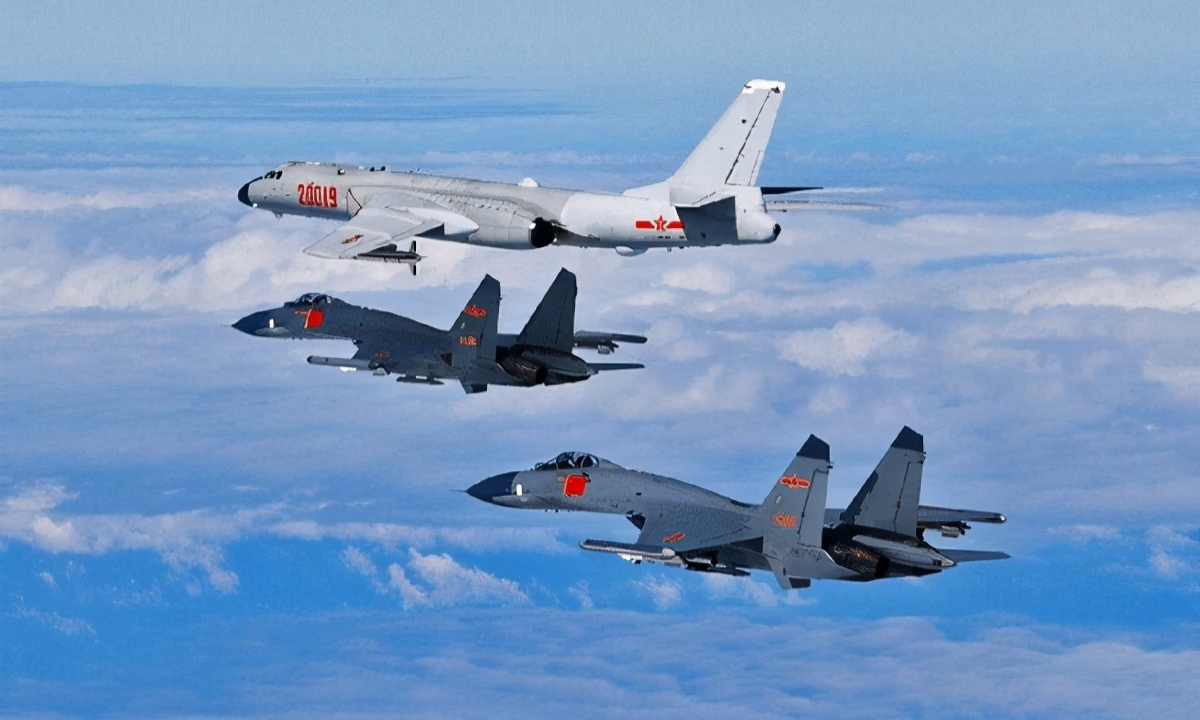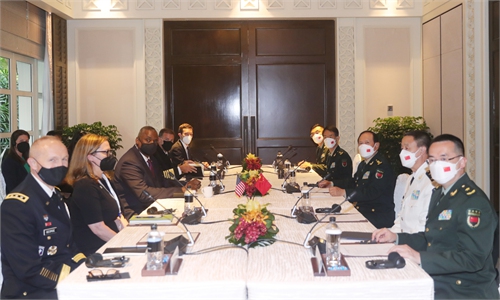Showing 'not hesitant to fight' attitude helps peace across Taiwan Straits: Global Times editorial

Photo: China Military
This year's Shangri-La Dialogue kicked off on Friday and will run through Sunday. Chinese State Councilor and Defense Minister Wei Fenghe will deliver an address on Sunday. On Friday, Wei held talks with US Secretary of Defense Lloyd Austin. Senior Colonel Wu Qian, a spokesperson of China's Ministry of National Defense, said at a press conference after the meeting that the meeting was not long but yielded positive effect. Overall, it was a frank, positive and constructive strategic communication.During the meeting, Wei reiterated China's firm stance on the Taiwan question, stressing if anyone dares to split Taiwan from China, the Chinese military will not hesitate to fight, and will resolutely crush any "Taiwan independence" attempts to firmly safeguard national sovereignty and territorial integrity at any cost. Austin reiterated that the US "remains committed to our longstanding one-China policy." The two sides believe that the two militaries should maintain high-level strategic communication, enhance their strategic mutual trust, manage and control conflicts and differences, and not turn conflicts and differences into confrontations.
Objectively speaking, against the background in which China-US tensions continue and the two countries have conflicts in many fields, effective face-to-face exchanges between the defense ministers of China and the US are of great significance for managing differences and stabilizing ties between the two militaries. What needs to be underlined in particular is that Wei has drawn a red line on the Taiwan question and once again showed China's attitude and will, which will help avoid dangerous misjudgments by the US and other relevant parties. This is the genuine safeguard of peace across the Taiwan Straits.
Taiwan is part of China. This is a universally recognized international consensus, which is generally accepted and clearly bolstered by the majority of countries and people across the world, except for some forces pretending to be deaf and blind and deliberately distorting its meaning. Any deceptive rhetoric under the banner of peace that puts aside or distorts this international consensus is a breach of regional peace and a misjudgment of China's determination. China has repeatedly emphasized that "relying on the US to seek independence" and "exploiting Taiwan island to control China" is playing with fire. If the Taiwan question is not properly handled, it will have a "subversive impact" on China-US relations. All these serious remarks are purposely oriented.
We noticed that the US announced a $120 million arms sale to Taiwan before Austin's trip, while US public opinion is keen to hype the People's Liberation Army's legitimate response to the provocation of the Australian military aircraft, confusing right and wrong and claiming that China's "provocative behavior" in the Asia-Pacific region has exacerbated the tension. At the same time, US Defense Department officials told media that one of the main goals for Washington this time is to set "guardrails" on the relationship between the two militaries to manage crises and ensure the competition between the two countries doesn't escalate into conflict. But the fact is that it is the US' moves that have constantly increased the risk of military conflict in the Asia-Pacific region.
Washington now puts a lot of emphasis on the so-called guardrails and crisis management between the two militaries, but not to realize long-term peace and stability. It wants to implement its salami slicing strategy so it won't choke while enjoying the slices. The US has no intention to stop manipulating the Taiwan question or creating divisions in the Asia-Pacific region. Instead, it is becoming increasingly imperious. While taking a confrontational stance that it must subjugate China, the US doesn't want to pay the high cost to defeat its opponent. This could be the genuine intent behind Washington's rhetoric about "guardrails" and "preventing competition from escalating."
It is important to note that the risks in the Asia-Pacific region have reached a point where they must be managed. But this can never be achieved by forcing China to give up its core interests. Washington has always proclaimed itself an Asia-Pacific country and considers itself responsible for the region's security. If that is the case, it should be its responsibility to eliminate the origin of the crises and abandon its Cold War mentality and sense of a zero-sum game. The US should truly fulfill its commitment: The US does not seek to have a new Cold War with China, to change China's system, or to revitalize alliances against China, and that the US does not support "Taiwan independence" or intend to seek a conflict with China. It should also become a constructive force in the Asia-Pacific region. In this case, is there any need for a "guardrail?"
The Shangri-La Dialogue focuses on military security agenda, the most sensitive area in relations between countries. This US-Western-dominated forum has left a deep impression on people that it has been targeting China. China sent its defense minister to this dialogue, demonstrating Beijing's sincerity in managing differences and its role as a responsible power for regional security. It is hoped that Wei's solemn statement of "smashing it even at any price, including war" can make some forces restrain their impulse and enable some countries to stay sober.

